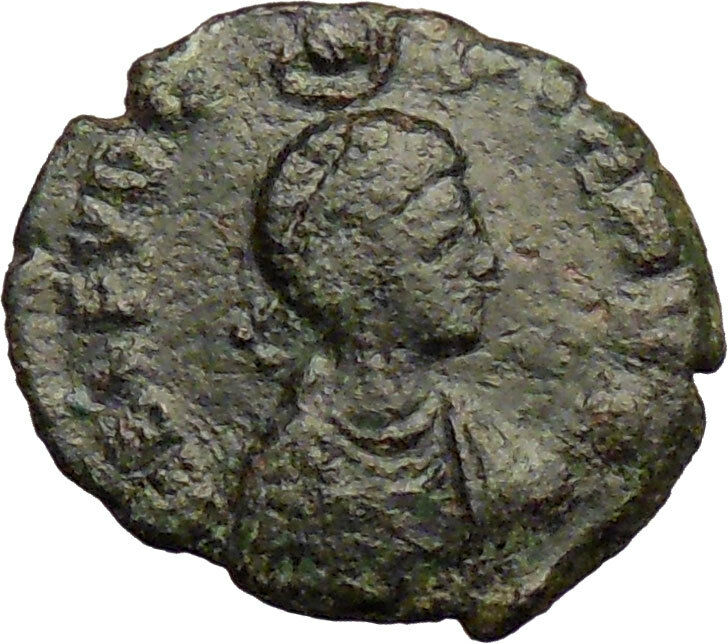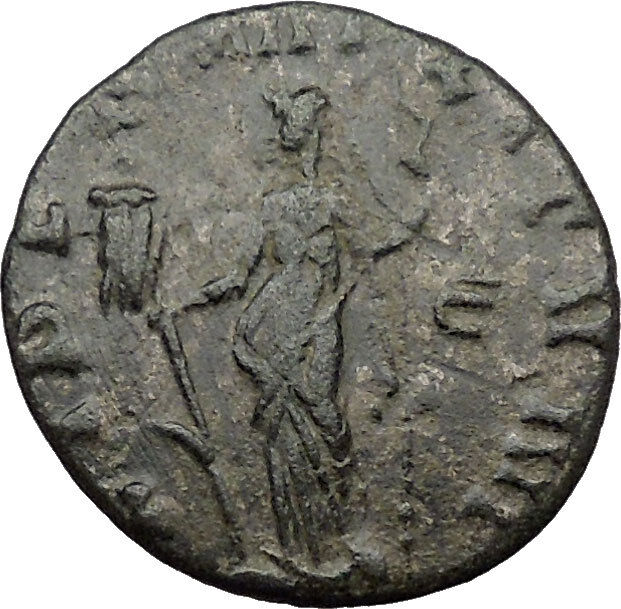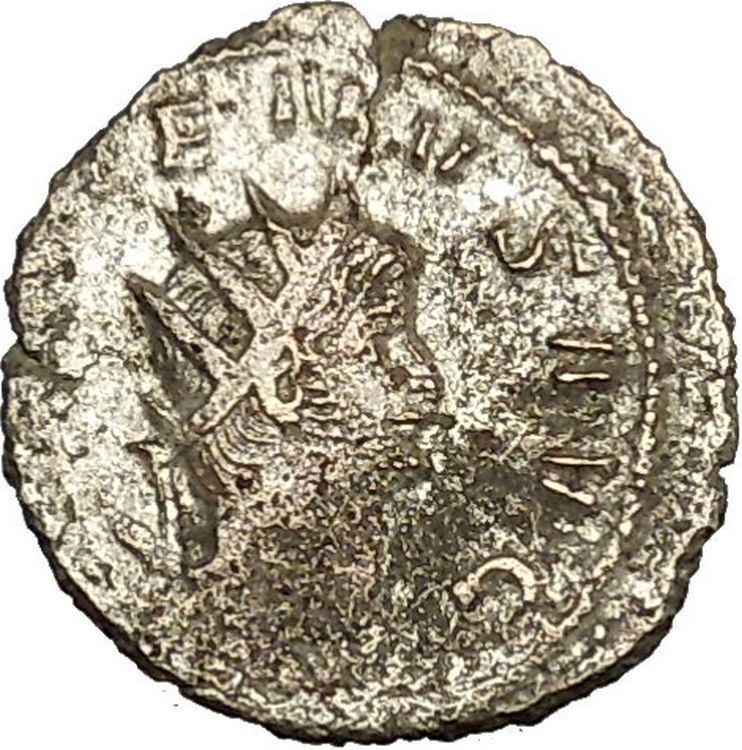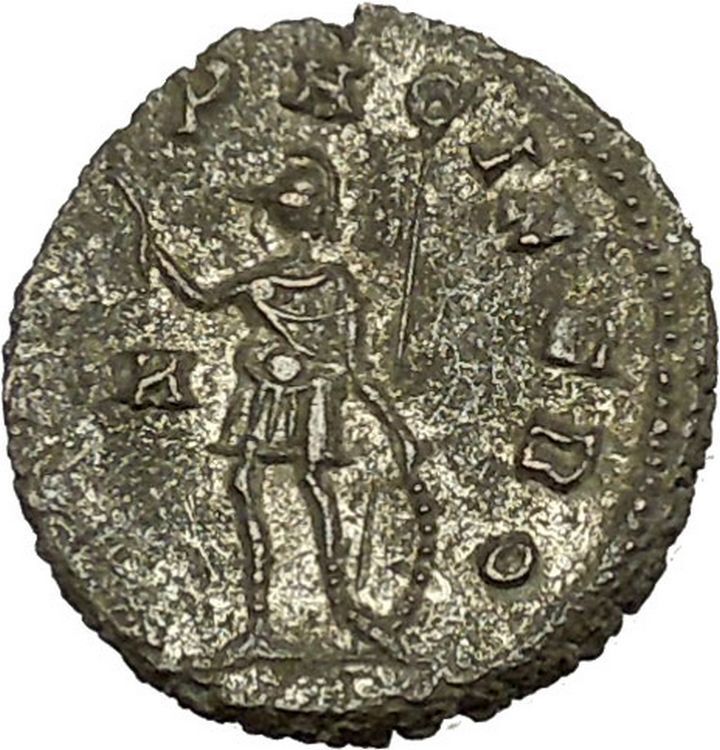|
Probus – Roman Emperor: 276-282 A.D.
Bronze Antoninianus 22mm (4.04 grams) Siscia mint, struck 276 A.D.
Reference: RIC V 682
IMP C M AVR PROBVS AVG, Radiate, draped, and cuirassed bust right.
FELICITAS AVG / Є/XXI, Felicitas standing left, holding caduceus and cornucopia.
You are bidding on the exact item pictured, provided with a Certificate of Authenticity and Lifetime Guarantee of Authenticity.
In ancient Roman culture, felicitas (from the Latin adjective felix, “fruitful, blessed, happy, lucky”) is a condition of divinely inspired productivity, blessedness, or happiness. Felicitas could encompass both a woman’s fertility, and a general’s luck or good fortune. The divine personification of Felicitas was cultivated as a goddess. Although felicitas may be translated as “good luck,” and the goddess Felicitas shares some characteristics and attributes with Fortuna, the two were distinguished in Roman religion. Fortuna was unpredictable and her effects could be negative, as the existence of an altar to Mala Fortuna (“Bad Luck”) acknowledges. Felicitas, however, always had a positive significance. She appears with several epithets that focus on aspects of her divine power.
Felicitas had a temple in Rome as early as the mid-2nd century BC, and during the Republican era was honored at two official festivals of Roman state religion, on July 1 in conjunction with Juno and October 9 as Fausta Felicitas. Felicitas continued to play an important role in Imperial cult, and was frequently portrayed on coins as a symbol of the wealth and prosperity of the Roman Empire. Her primary attributes are the caduceus and cornucopia. The English word “felicity” derives from felicitas.
As virtue or quality
In its religious sense, felix means “blessed, under the protection or favour of the gods; happy.” That which is felix has achieved the pax divom, a state of harmony or peace with the divine world. The word derives from Indo-European *dhe(i)l, meaning “happy, fruitful, productive, full of nourishment.” Related Latin words include femina, “woman” (a person who provides nourishment or suckles); felo, “to suckle” in regard to an infant; filius, “son” (a person suckled); and probably fello, fellare, “to perform fellatio”, with an originally non-sexual meaning of “to suck”. The continued magical association of sexual potency, increase, and general good fortune in productivity is indicated by the inscription Hic habitat Felicitas (“Felicitas dwells here”) on an apotropaic relief of a phallus at a bakery in Pompeii.
In archaic Roman culture, felicitas was a quality expressing the close bonds between religion and agriculture. Felicitas was at issue when the suovetaurilia sacrifice conducted by Cato the Elder as censor in 184 BC was challenged as having been unproductive, perhaps for vitium, ritual error. In the following three years Rome had been plagued by a number of ill omens and prodigies (prodigia), such as severe storms, pestilence, and “showers of blood,” which had required a series of expiations (supplicationes). The speech Cato gave to justify himself is known as the Oratio de lustri sui felicitate, “Speech on the Felicitas of his Lustrum”, and survives only as a possible quotation by a later source. Cato says that a lustrum should be found to have produced felicitas “if the crops had filled up the storehouses, if the vintage had been abundant, if the olive oil had flowed deliberately from the groves”, regardless of whatever else might have occurred. The efficacy of a ritual might be thus expressed as its felicitas.
The ability to promote felicitas became proof of one’s excellence and divine favor. Felicitas was simultaneously a divine gift, a quality that resided within an individual, and a contagious capacity for generating productive conditions outside oneself: it was a form of “charismatic authority”. Cicero lists felicitas as one of the four virtues of the exemplary general, along with knowledge of military science (scientia rei militaris), virtus (both “valor” and “virtue”), and auctoritas, “authority.” Virtus was a regular complement to felicitas, which was not thought to attach to those who were unworthy. Cicero attributed felicitas particularly to Pompeius Magnus (“Pompey the Great”), and distinguished this felicitas even from the divine good luck enjoyed by successful generals such as Fabius Maximus, Marcellus, Scipio the Younger and Marius.
The sayings (sententiae) of Publilius Syrus are often attached to divine qualities, including Felicitas: “The people’s Felicitas is powerful when she is merciful” (potens misericors publica est Felicitas).
Epithets
Epithets of Felicitas include:
- Augusta, the goddess in her association with the emperor and Imperial cult.
- Fausta (“Favored, Fortunate”), a state divinity cultivated on October 9 in conjunction with Venus Victrix and the Genius Populi Romani (“Genius” of the Roman People, also known as the Genius Publicus).
- Publica, the “public” Felicitas; that is, the aspect of the divine force that was concerned with the res publica or commonwealth, or with the Roman People (Populus Romanus).
- Temporum, the Felicitas “of the times”, a title which emphasize the felicitas being experienced in current circumstances.
 Probus (Latin: Marcus Aurelius Probus Augustus; c. 19 August 232 – September/October 282), was Roman Emperor from 276 to 282. Probus (Latin: Marcus Aurelius Probus Augustus; c. 19 August 232 – September/October 282), was Roman Emperor from 276 to 282.
During his reign, the Rhine and Danube frontier was strengthened after successful wars against several Germanic tribes such as the Goths, Alamanni, Longiones, Franks, Burgundians, and Vandals. The Agri Decumates and much of the Limes Germanicus in Germania Superior were officially abandoned during his reign, with the Romans withdrawing to the Rhine and Danube rivers.
Early life
Born in 232 in Sirmium (modern day Sremska Mitrovica), Pannonia Inferior, the son of Dalmatius.
Military career
Probus entered the army around 250 upon reaching adulthood. Appointed as a military tribune by the emperor Valerian, he later distinguished himself under the emperors Aurelian and Tacitus. He was appointed governor of the East by Tacitus, whose death in 276 prompted Probus’ soldiers to proclaim him emperor.
Florianus, the half-brother of Tacitus, was also proclaimed successor by his soldiers, but he was killed after an indecisive campaign. Probus travelled west, defeating the Goths along the lower Danube in 277, and acquiring the title of Gothicus. His position as emperor was ratified by the Senate around this time.
As emperor

Sculpted head of Probus from Brescia in northern Italy.
In 278, Probus campaigned successfully in Gaul against the Alamanni and Longiones; both tribes had advanced through the Neckar valley and across the Rhine into Roman territory. Meanwhile, his generals defeated the Franks and these operations were directed to clearing Gaul of Germanic invaders (Franks and Burgundians), allowing Probus to adopt the titles of Gothicus Maximus and Germanicus Maximus.
One of his principles was never to allow the soldiers to be idle, and to employ them in time of peace on useful works, such as the planting of vineyards in Gaul, Pannonia and other districts, in order to restart the economy in these devastated lands. Of a greater and more lasting significance, Probus began the strategy of settling the Germanic tribes in the devastated provinces of the empire.
In 279-280, Probus was, according to Zosimus, in Raetia, Illyricum and Lycia, where he fought the Vandals. In the same years, Probus’ generals defeated the Blemmyes in Egypt. Probus then ordered the reconstruction of bridges and canals along the Nile, where the production of grain for the Empire was centered.
In 280-281, Probus put down three usurpers, Julius Saturninus, Proculus and Bonosus. The extent of these revolts is not clear, but there are clues that they were not just local problems (an inscription with the name of Probus erased has been found as far as Spain). In 281, the emperor was in Rome, where he celebrated his triumph.
Probus was eager to start his eastern campaign, delayed by the revolts in the west. He left Rome in 282, travelling first towards Sirmium, his birth city.
Assassination
Different accounts of Probus’s death exist. According to Joannes Zonaras, the commander of the Praetorian Guard Marcus Aurelius Carus had been proclaimed, more or less unwillingly, emperor by his troops.
Probus sent some troops against the new usurper, but when those troops changed sides and supported Carus, Probus’ remaining soldiers assassinated him at Sirmium (September/October 282). According to other sources, however, Probus was killed by disgruntled soldiers, who rebelled against his orders to be employed for civic purposes, like draining marshes. Carus was proclaimed emperor after Probus’ death and avenged the murder of his predecessor.
|





 Probus (Latin: Marcus Aurelius Probus Augustus; c. 19 August 232 – September/October 282), was Roman Emperor from 276 to 282.
Probus (Latin: Marcus Aurelius Probus Augustus; c. 19 August 232 – September/October 282), was Roman Emperor from 276 to 282.





